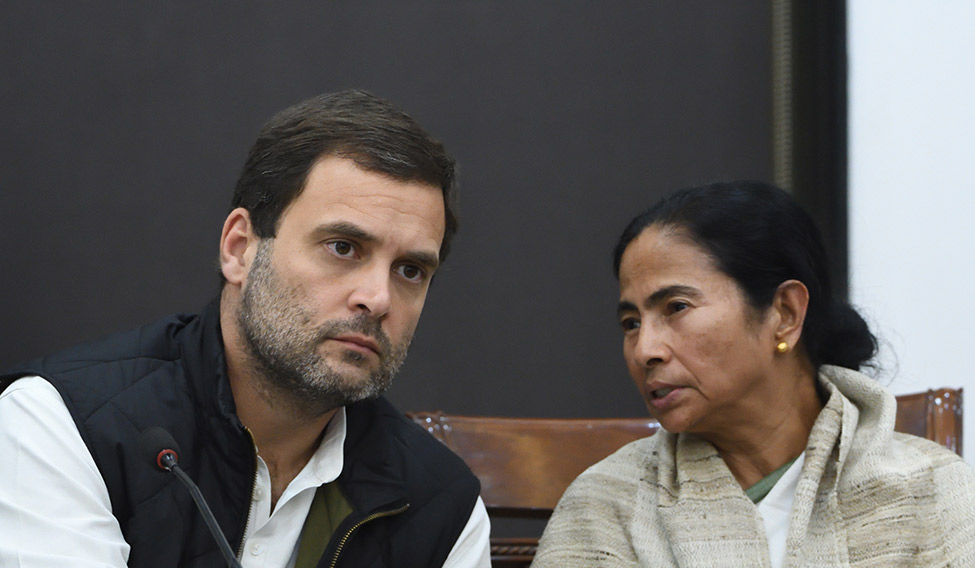The venue was neutral, and the table round, indicating that it was a conclave of peers. Yet Congress vice president Rahul Gandhi’s call for a meeting of opposition parties and a joint press conference at the Constitution Club in Delhi on December 27 met with limited success. Only eight of the 15 parties that were invited attended.
Rahul had rubbed the opposition chieftains the wrong way on the last day of the winter session of Parliament. Their hopes of a concerted attack against the BJP and Prime Minister Narendra Modi had soared when he announced that he had information of personal corruption by Modi. As they were expecting Rahul to make the exposé, he let them down by meeting Modi to take up the issues of farmers of Uttar Pradesh. It came just ahead of an opposition march to Rashtrapati Bhavan to petition President Pranab Mukherjee on the demonetisation. Many parties dropped out of the march.
Perhaps mindful of the damage he had done to the cause of opposition unity, Rahul tried to strike a conciliatory note after the meeting at the Constitution Club, by praising the other parties. “We are very happy to embrace them,” he said.
As he now raises the pitch of his attack against Modi, terming the demonetisation as an anti-people decision that has hurt the poor the most and benefitted the rich, he needs the support of other opposition forces to amplify the attack. Therein lies the realisation that a weakened Congress cannot take on Modi single-handedly.
Of the eight parties that responded positively to Rahul’s call for the meeting, the most enthusiastic was the Trinamool Congress. Its leader, West Bengal Chief Minister Mamata Banerjee, flew down to Delhi to share the stage with Rahul. In fact, she has been the most strident among the opposition leaders in their attack on Modi, and she said he should resign if the cash shortage continued after December 30. Modi had promised that the demonetisation woes would end by that day.
Mamata’s offensive against Modi is to be seen in the context of her national ambitions and the fact that the demonetisation was done with an eye on the Lok Sabha elections in 2019. The meeting at the Constitution Club gave her a national platform to take on Modi. She had a prime spot on the stage and got more airtime than even Rahul at the joint press meet. She is said to be playing an active role in getting more parties on board.
At the meeting, Mamata emphasised the need to have proper pre-consultations with other parties and come up with a common minimum agenda for the grouping. A leader close to her said that even on the day of the meeting, she had called Rashtriya Janata Dal leader Lalu Prasad, National Conference’s Omar Abdullah and Delhi Chief Minister Arvind Kejriwal, seeking their cooperation.
“There are so many political parties. They have their own policy decisions, their own systems. But we have to think of how to hold a meeting and organise everyone so that we can go together,” Mamata said. At the press meet, she indirectly appealed to the left parties to join the grouping.
While the DMK, the RJD, the Janata Dal (Secular), the All India United Democratic Front, the Jharkhand Mukti Morcha and the Indian Union Muslim League also attended the meeting, the Janata Dal (United) and the left parties declined the invite. Bihar Chief Minister Nitish Kumar of the JD(U) had supported the demonetisation as a move to root out black money, but the party is said to be mulling a nuanced change of stance after December 30. The left parties were peeved by the bonhomie between the Congress and the Trinamool Congress.
Asked about the road ahead for the opposition parties, Mamata said the leaders would meet again in January to ensure a coordinated approach, and rallies would be held in different parts of the country.
The Congress has planned a nationwide agitation on the demonetisation and the corruption allegations against Modi. Rahul has held meetings with party general secretaries and state leaders, and has appointed 160 of them as ‘demonetisation coordinators’. The state units have been asked to intensify the agitation. Delhi Congress president Ajay Maken said his unit had taken up the plight of migrant workers. “Lakhs of labourers have had to go back home. There are 48 lakh workers in Delhi, who are part of the unorganised sector, and demonetisation has rendered them without a livelihood,” he said.
While celebrating the party’s 132nd foundation day, Rahul asked his followers to fight against the “politics of anger” by the BJP and the RSS. “Congress has to stand with the poor, the middle class, the labourers and the small traders. We have to go to the people. I am sure you will do this. And fight against this RSS ideology of spreading anger,” he said. He released a charter of demands that includes immediate removal of restrictions on withdrawal of money, depositing of Rs 25,000 in the account of at least one woman belonging to each BPL family as compensation, doubling of work days and wages under the National Rural Employment Guarantee Scheme and an income tax and sales tax rebate of 50 per cent to small shopkeepers and businesses.
As Rahul looks set to take over as president of the Congress and attempts to present himself as a credible challenger to Modi, he will first have to prove his political acumen in dealing with the other opposition leaders and their prime ministerial ambitions.








